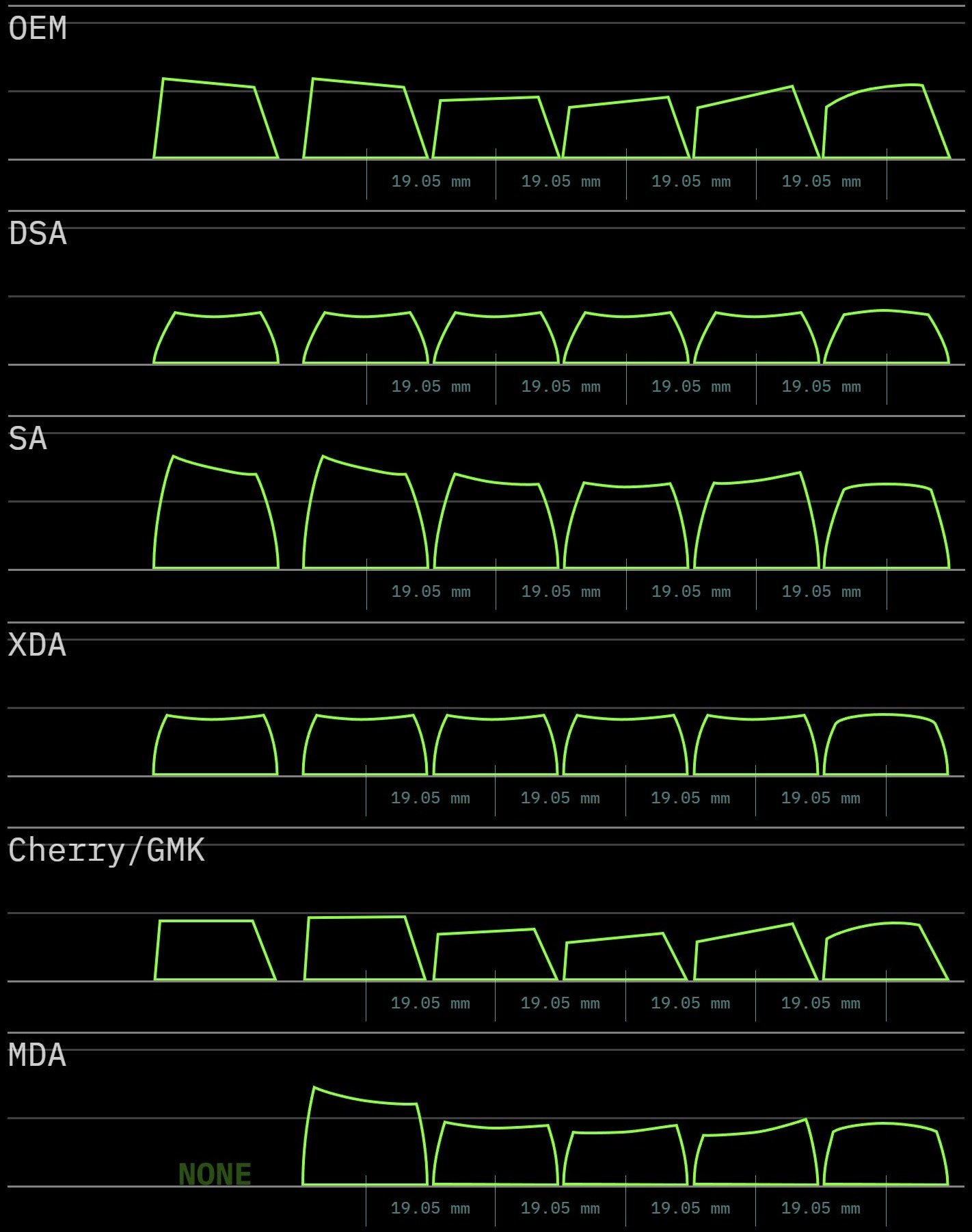What are the Keycaps profiles? SA vs. DSA vs. OEM vs. Cherry vs. XDA vs. MDA? What are the best mechanical keyboard profiles? Profiles for writing or profiles for gaming? Today we’ll look at one of the most important aspects of typing with a mechanical keyboard: What keycap profiles are available? Perhaps you’ve only used membrane keyboards with completely flat keys, such as Apple models, and now you realize there’s a whole other world out there.
A mechanical keyboard is made up of a keycap, which is the plastic part, and a switch, which is the part that we feel when we type.
The profile of the keys is an important part of the keyboard. It also depends on the Switch inside and the material used to make the keycaps (ABS or PBT).
Let’s answer a few questions: “What’s the point of sculpted key sets?” “What about flat or uniform?” “Which key profile should I buy?”
Keycap Profiles
I believe www.keycaps.info is a great website where you can compare all the keycap profiles. Quite helpful. You might see something like:

Stacking profiles to see how the sizes of their different keys are different:

Sculpted vs Uniform Keycap Profiles
We are going to have two main types of keycaps based on their shape: sculpted keycaps and uniform keycaps.
- Uniform keycaps: In the uniform profile we have all the keys (keycaps) with the same shape and height.
- Sculpted Keycaps: A sculpted profile keyboard has a varied shape (angles) and height for each row of keys.
SA vs DSA vs OEM vs Cherry vs XDA vs MDA
Most people use CHERRY or OEM. On a lot of keyboards, you can find the OEM. Here’s a quick look at both of them so you can choose:
| Profile | Profile | Size | Keycap Top | Description |
| OEM | Sculpted | Medium: 10 to 12 mm | Cylindrical | It is found on most keyboards. The standard. The top is angled. |
| CHERRY | Sculpted | Medium: 10mm | Cylindrical | Very similar to the OEM profile, but shorter. Very popular. |
| DSA | Uniform | Short: 7.6mm | Bit spherical | Slightly shorter profile with spherical top. |
| XDA | Uniform | Medium: 9mm | Spherical | Mid-rise profile with ball top |
| SA | Sculpted | Height: 16.5mm | Spherical | High profile with a slightly spherical and angled top. |
| MDA | Sculpted | Half | Spherical | Medium profile with height between XDA and SA |
- SA: Tall, sculpted key profile that produces a very “thock” (excellent) sound. They have a vintage design. They were used in IBM Models M keyboards . If you raise your hands while typing, this is a good profile for you.
- DSA: Very Short Uniform Key Profile (Low Profile). It is not what you are used to for writing, but they can be used for gaming. They have a similar sound to Cherry keycaps.
- OEM: Standard size and shape of most keycaps. The cheapest and most common option. Brands like Logitech, Razer, and Corsair often use this profile. Good option also for writing or gaming.
- Cherry: A short profile that is sculpted at a cutting angle for easy writing. Shorter keys than OEM, which cause a deeper sound. One of the best profiles for both writing and gaming.
- XDA: short uniform short key profile, slightly taller than DSA. They sound similar to the Cherry profile. It is more difficult to get used to this profile because it is uniform.
- MDA – has a medium profile with sculpted and spherical keycaps (between XDA and SA)
Conclusion!
It’s important. But you probably didn’t care about it until you started using mechanical keyboards.
Choosing a good “Keycap Profile” can help you type faster or have more fun playing your favourite games.
Choosing the right height for your keycaps based on the shape of the top (flat, spherical, or cylindrical) can make a big difference in how you use that beautiful mechanical keyboard you just bought.
Your experience will also be affected by the type of Switch (and whether or not it is lubricated), the material used to make the keycaps, the overall quality of the keyboard, its layout (ANSI or ISO), and its size (better to go for TKL or smaller keyboards at the moment).
If we had to suggest two profiles right now, we’d say that either OEM or Cherry are great options. But don’t rule out other options; try them out for yourself.


